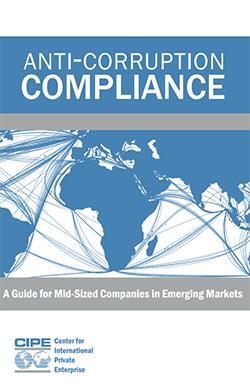
With bribery amounting to an estimated $1 trillion per year globally, corruption is now recognized to be one of the world’s greatest challenges. The costs of corruption affect the entire scope of international value chains – with the extra financial burden estimated to add at least 10 percent to the costs of doing business.
To comply with international anti-corruption norms and regulations, such as the Organisation for Economic Co-operation and Development (OECD) Anti-Bribery Convention, the U.K. Bribery Act, and the U.S. Foreign Corrupt Practices Act, the private sector must take greater responsibility in working to eliminate corruption. Companies that operate internationally must therefore pay attention not just to ethical conduct of their own employees, but also to how their suppliers, distributors, and agents behave in countries where they work.
In turn, local companies that aspire to join global value chains need to understand the importance of anti-corruption and how to move from commitments to action. To support the private sector in this challenge, CIPE created Anti-Corruption Compliance: A Guide for Mid-Sized Companies in Emerging Markets, geared specifically at helping local firms introduce practical, yet effective anti-corruption compliance programs. In the latest Economic Reform Feature Service article, CIPE Director of Multiregional Programs Anna Nadgrodkiewicz highlights the strategic investment for local firms in anti-corruption compliance as well as key elements of effective compliance programs.
The advantages of better anti-corruption compliance are not limited to individual firms, but can have far-reaching impact for both local and international business communities. The World Bank estimates that there is a 400 percent “governance dividend” for countries that act to control corruption — translating to, on average, a four-fold increase in per capita incomes. For a country with an income per capita of US $2,000, that is an expected US $8,000 in the long run by taking steps to control corruption. Countries with lower corruption, stronger property rights, and greater rule of law, the difference in business sector growth is about 3 percent per year for enterprises.
The global anti-corruption trend has encouraged multinational companies to partner with local firms that have taken the initiative towards doing business with integrity. Therefore, local firms with a clear ethical branding have a competitive advantage within broader global value chains. In its new guidebook, CIPE uses its experience in working with the private sector around the world to create a practical roadmap of manageable steps to improve internal compliance measures.
For a more in-depth look at CIPE’s new guide on anti-corruption compliance, read the latest Economic Reform Feature Service article here or download the complete guidebook. For current updates, ongoing trends, and issues related to anti-corruption compliance in emerging and frontier markets, visit CIPE’s new Corporate Compliance Trends website.
Stephanie Bandyk is Program Assistant for Global Programs at CIPE.

